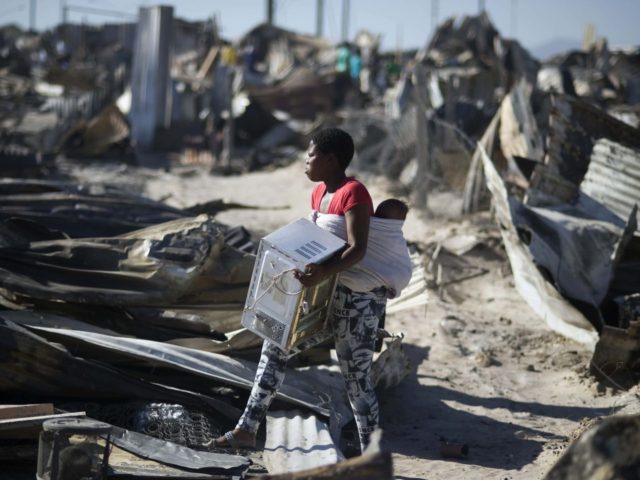Most of the world’s deadliest pollution is concentrated in the Third World, largely among poor households which have little or no access to electricity produced by fossil-fuel power.
Serious pollution in the West, however, is negligible.
This is the clear message of the latest State of Global Air report produced by the Health Effects Institute and Institute for Health Metrics and Evaluation.
But it is not, needless to say, how it is being reported in the liberal media.
The Guardian, for example, headlines its story: “More than 95% of world’s population breathe dangerous air, major study finds”.
This sounds bad, until you realize that the “dangerous” air being talked about here is only “dangerous” because it contains concentrations of particulate matter known as PM2.5.
Ah yes: our old friend PM2.5. We dealt with this pseudo-scientific fake news scare story this time last year, at the time of the previous State of Global Air report.
Though heavily touted by the pre-Trump-era Environmental Protection Agency as one of the greatest health threats of our age, it turns out that no one has ever successfully demonstrated it to be a real health problem.
You can read the full details on this fact sheet.
Not one single epidemiological study, not one toxicological study, not one clinical study has EVER demonstrated that PM2.5 is capable of causing death either in the short term or due to prolonged exposure. If these tiny particles (which by the way are produced by dust, pollen, mould, pet dander, forest fires, sea spray and volcanoes, among other natural sources, as well as from cigarette and dope smoking, wood fire burning and fossil fuel burning) were as deadly as the EPA claims, people would be dropping like flies from London to New York to Beijing.
So we can safely ignore the part of the State of Global Air report which bangs on about PM2.5 and focus on the far more significant part: the one that deals with pollution deaths in the Third World caused by cooking in insufficiently ventilated homes using wood, vegetable matter, dung, charcoal, coal or other “solid fuels.”
These are indeed a major killer:
Household air pollution was responsible for 2.6 million deaths (4.7% of the global total) and 77 million DALYs (3.2% of the global total) in 2016. The regional patterns of mortality burden reflect the size of populations as well as the proportions of households using solid fuels. China, India and its neighbors Pakistan and Bangladesh, Indonesia, and the African nations of Nigeria, the Democratic Republic of Congo, Ethiopia, and Tanzania are among those countries bearing the heaviest burden.
Although representing 4.7% of all deaths globally, household air pollution exposure accounts for substantially greater percentages of the worldwide mortality due to ischemic heart disease, stroke, lung cancer, LRIs, and COPD. Of the 2.6 million deaths attributable specifically to household air pollution, 46% were linked to ischemic heart disease and stroke.
And the real scandal here is that this problem has been exacerbated by Western environmentalists who don’t want to give Third World countries access to cheap, fossil-fuel-powered electricity because ‘climate change.’
A prime offender is the World Bank, whose iniquitous, pro-green, anti-human policies I describe here.
It won’t fund any more coal-fired power stations because they are not clean and green. Instead, it wants developing nations to embrace intermittent, unreliable and wildly expensive renewables like wind and solar as part of a mission — outlined by former UN Secretary General Ban Ki-moon — to ‘defeat poverty and save the planet’. In fact, it will achieve neither of those goals. Take Nigeria, whose capital Lagos has overtaken Cairo as Africa’s largest city, but whose electrical grid produces so little power that the economy runs mostly on private (and filthy, polluting) diesel generators. Nigeria’s National Electric Power Authority (NEPA plc) is known as ‘Never Expect Power Always, Please Light a Candle’. Blackouts and brownouts are common, as they are throughout sub-Saharan Africa, and the costs to the economy are enormous. The local mobile phone company MTM, with 62 million subscribers, spends 70 per cent of its operating expenditure on diesel to keep its network powered up.
Here is Nigeria’s Minister of Finance, Kemi Adeosun: ‘We want to build a coal power plant because we are a country blessed with coal, yet we have a power problem. So it doesn’t take a genius to work out that it will make sense to build a coal power plant. However, we are being blocked because it is not green. This is not fair, because they have an entire western industrialisation that was built on coal-fired energy.”
You won’t find this mentioned in the report, needless to say. That’s because it is written and researched by people who want to demonstrate that fossil fuels are the problem – and never mind the evidence to the contrary.

COMMENTS
Please let us know if you're having issues with commenting.